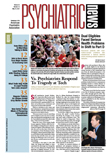Immediately following the Virginia Tech shootings last month (see
“Va. Psychiatrists Respond to Tragedy at Tech”), APA initiated several activities to support those directly involved with the event, respond to media requests, and inform the public about common responses to large-scale tragedies such as this one.
APA's Office of Communications and Public Affairs prepared a press release expressing the organization's condolences, pointing out that strong emotional reactions (sometimes with physical as well as psychological symptoms) to traumatic events were natural, and encouraging anyone who thought they may need help in dealing with the tragedy to seek it.
The press release outlined several steps that people can take to help them cope with their reactions to a disaster or traumatic event. These include avoiding “overexposure to news rebroadcasts of the event,” talking about feelings with family or friends who are also processing their feelings about the tragedy, and at what point postdisaster anxiety and depression warrant seeking help from a psychiatric physician.
The Office of International Affairs, whose purview includes disaster psychiatry, e-mailed Internet links on disaster psychiatry to Edward Kantor, M.D., chair of the Psychiatric Society of Virginia's Disaster Committee, and offered technical help such as access to the APA disaster-related list serve. The office sent an e-mail on April 18 to district branch disaster committee chairs throughout the United States asking for the names of volunteers who could assist Virginia Tech students who were heading back to their homes in other states and might want consultation for coping with the massacre on their campus. By the following week, the names of 140 volunteers had been collected.
After material produced by the gunman and mailed in the midst of the shootings was received and broadcast by NBC News, APA President Pedro Ruiz, M.D., issued an open letter to the news media urging them to stop airing the“ disturbing writings, photographs, and video.” He backed his statement with reports from the World Health Organization and Columbia University researchers delineating the dangers that could arise as a result of copycat suicides or homicides.
The Office of Communications and Public Affairs helped arrange interviews between APA members and local or national print and broadcast media on topics ranging from copycat crimes to gun control to whether such events can be prevented by identifying potentially dangerous individuals. Jerald Kay, M.D., chair of APA's Corresponding Committee on Mental Health on College and University Campuses, was interviewed repeatedly, often on the status of mental health services on college campuses. He explained to UPI, for example, that“ while the demand for services has increased, many college mental health units haven't been able to keep up.”
